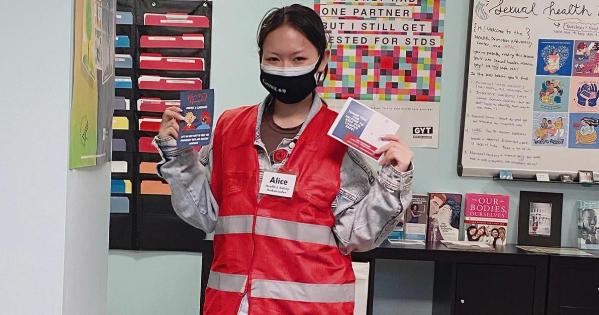AU Student Ambassadors Help Keep Campus Safe

There’s a new sight on campus blended among those familiar signs of spring—blooming cherry trees outside SIS, neighbors walking dogs, and students soaking up the sun and mild weather in between classes.
So what’s new? It’s the students wearing red vests and carrying spare masks as part of the Health and Safety Ambassadors program, developed this academic year by Office of Campus Life’s Mickey Irizarry, director of the Health Promotion and Advocacy Center, and Ashley Ann Wallace, assistant director of facilities and events services, University Center.
Irizarry initially recruited ambassadors to help educate people on campus about policies and model safe behavior for visitors. However, as new testing capabilities became available, Irizarry and Wallace knew that students could provide valuable support in the COVID testing clinics. The group’s core mission is to balance safety and community, especially as AU is focused on bringing students back to campus.
To help maintain COVID-19 safety standards, “We knew we would want to have some sort of peer-to-peer social impact group,” said Irizarry.
Made up of undergraduates from all classes and programs, ambassadors went through intensive training for the role. In the clinics, ambassadors check visitors in and show them how to take the tests. However, they are most visible walking around campus, where they answer questions from the community and flash the thumbs up sign to people they see following COVID safety protocols.
Knowing how to offer friendly encouragement and positive reinforcement is an important skill for ambassadors, who see themselves more as educators than enforcers. “We’re more like friends,” says Alice Wang, a senior business administration student. In the most atypical year of her undergraduate experience, she said she joined the ambassadors program to regain a sense of normalcy and be on campus again.
Wang’s experience has helped her connect with old and new friends, including several students on campus for the first time through the Mid-Semester Residential Experience. When she applied for the job, she didn’t expect community building to become such a significant part of her role. She’s since embraced it and loves welcoming new students to the AU community.
“When you run into us on shifts, you can ask us any questions,” Wang said, adding that she views her role as kind of like a big sister, filling new students in on the things she had to figure out on her own, like the best restaurants in Tenleytown, or how to make sense of the shuttle schedule.
For Chante Yarbrough, the community aspect goes further than just AU. As a DMV native and graduating senior in the public health program, the risks of COVID-19 hit closer to home, and she was worried what reopening campus might mean for the rest of the city. When she heard about the HSA, she knew she had to get involved because “that’s the reason why I got into public health, because I know that there are important issues in health and healthcare that touch so many different issues.”
Some aspects of the role have been challenging, like transitioning the community to the new Shield T3 testing system or convincing students not to let their guards drop. However, knowing “that we’re keeping the campus and the community safe,” has made the experience worth it, she says, and she’s excited to take the skills she learned into a career in community outreach and emergency management.
With internships, labs, and classes restricted during the pandemic, students are searching for ways to stay engaged. Participating in the ambassadors program has helped by providing experiential learning opportunities, a key part of the AU experience. While walking students and faculty through the COVID-testing process, ambassadors have discovered hidden strengths, such as language skills or tech savviness, that they didn’t expect to come in handy in their role.
“I find I’m a more tech literate person, so when I’m [at the clinics], and someone has a tech problem, I’ll be the person they like to call over,” said Public Health Scholar John Ferrer. He said becoming an ambassador pushed him to develop his public speaking and problem-solving skills and would encourage any students, not just public health students, to consider becoming an ambassador next year if the program continues.
Irizarry and Wallace said that, while it’s not clear what the fall will look like, the Health and Safety Ambassadors program will keep running as long as there is a need.
While the community eagerly looks forward to the day we can all be together again, “It’s been really nice to help move the university through this,” Wallace said as she reflected on the first semester of the program.